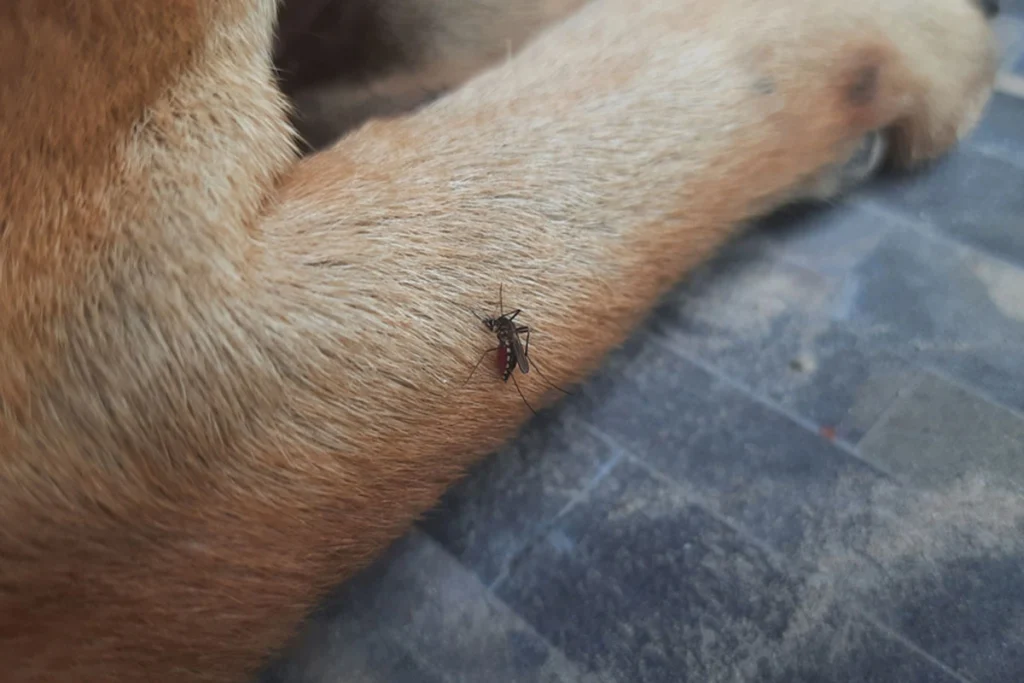What Can Mosquito Bites Cause in Cat and Dog
Mosquitoes are not just an annoyance to humans; they also pose risks to our pets. Whether you have a dog that enjoys outdoor adventures or a cat that lounges near open windows, mosquitoes can bite your pets, potentially leading to health complications. Understanding what can mosquito bites cause in cat and dog is crucial for pet owners to protect their animals from diseases and discomfort.
In this guide, we’ll discuss how to recognize mosquito bites on pets, the possible health issues, and how to treat and prevent these bites using safe, pet-friendly solutions. We’ll also explore effective mosquito treatments that are safe for cats and dogs, including natural options and preventive measures.
Can Cats and Dogs Get Mosquito Bites?

Do Mosquitoes Bite Cats and Dogs?
Yes, mosquitoes bite both cats and dogs, despite their fur acting as a partial barrier. Their skin, especially in areas where there is less fur, is vulnerable to these pesky insects. Mosquito bites can be found on exposed areas such as the ears, nose, and belly, and even a single bite can lead to itching or more serious complications.
You might wonder: can dogs get mosquito bites, and do mosquitoes bite cats? The answer is a resounding yes. Both species are at risk, particularly during peak mosquito seasons when pets spend time outdoors, or when mosquitoes invade the home. Cats and dogs are attractive to mosquitoes for the same reasons humans are: they emit heat, exhale carbon dioxide, and have movement patterns that mosquitoes can detect.
Signs of Mosquito Bites on Pets
It can be challenging to spot mosquito bites on pets due to their fur, but knowing what to look for can help. What do mosquito bites look like on dogs and cats? They often appear as small, red, raised bumps that may cause the animal to scratch or bite at the area. These bites are typically found on the ears, nose, or areas with less fur.
For cats, you might notice a cat mosquito bite on the ears, around the eyes, or near the mouth. For dogs, the bites are often found on the belly, paws, or other exposed areas.
Common symptoms of mosquito bites in pets include:
- Scratching or biting at the skin.
- Red, irritated spots or bumps.
- Swelling or hives in severe cases.
Health Risks Associated with Mosquito Bites
Heartworm Disease
One of the most significant risks of mosquito bites in pets is heartworm disease. Mosquitoes transmit this dangerous parasite through their bite, and once a pet is infected, the heartworms can grow and live in the heart, lungs, and blood vessels, causing severe health problems.
Symptoms in Dogs:
- Persistent cough.
- Fatigue after light exercise.
- Weight loss or loss of appetite.
- Heart failure in advanced cases.
Symptoms in Cats:
- Coughing or difficulty breathing.
- Vomiting or lack of appetite.
- Sudden death in severe cases (though less common than in dogs).
Heartworm disease is preventable through the use of monthly medications, but once contracted, it can be life-threatening, especially for dogs. Cats can be infected too, though they are less common hosts. Always ensure that your pets are on a heartworm preventative medication if they are exposed to mosquitoes.
Allergic Reactions to Mosquito Bites
Just like humans, pets can develop allergic reactions to mosquito bites. This condition is called mosquito bite hypersensitivity, and it often leads to excessive itching, redness, and swelling in affected areas. Some pets may have an exaggerated reaction that results in hives, welts, or even difficulty breathing.
In severe cases, pets may need medical treatment to manage the allergic reaction. If you notice persistent swelling, hives, or unusual symptoms following a mosquito bite, it’s best to consult your veterinarian immediately.
West Nile Virus and Other Mosquito-Borne Diseases
Though rarer, mosquitoes can also transmit diseases such as West Nile virus to pets, primarily dogs. The symptoms may range from mild to severe and could include fever, lethargy, and even neurological issues in extreme cases.
While cats are generally less susceptible to West Nile virus, there have been documented cases of infection. Other mosquito-borne illnesses that may affect pets include encephalitis and various forms of fevers, though these are less common than heartworm.
How to Treat Mosquito Bites on Dogs and Cats

Immediate Care
After noticing mosquito bites on your pet, the first step is to ensure they are comfortable and that the itching is under control. Here’s a basic guide on how to treat mosquito bites on dogs and cats safely:
- Clean the Affected Area: Gently clean the bite area with mild soap and water to prevent any infection. This also removes any bacteria or allergens from the skin.
- Cold Compress: Apply a cold compress or ice pack to reduce swelling and itching. Make sure to wrap the ice pack in a towel to avoid direct contact with the skin, which could cause frostbite.
- Anti-Itch Cream: If your pet is particularly bothered by the bites, consult your veterinarian about using a pet-safe anti-itch cream or spray. Never use human products like hydrocortisone without professional advice, as they can be toxic to animals.
When to Visit the Vet
While most mosquito bites are harmless, there are certain signs that indicate a need for a vet visit. These include:
- Persistent scratching or licking of the bite area.
- Excessive swelling or redness.
- Signs of infection, such as pus or oozing at the bite site.
- Any signs of allergic reactions like hives, breathing difficulties, or significant swelling.
If you notice any of these symptoms, especially those linked to heartworm disease or allergic reactions, it’s best to seek veterinary care promptly.
Safe Mosquito Treatments for Cats and Dogs
Mosquito Repellents Safe for Pets
Finding the right mosquito treatment safe for cats and dogs is essential, as many human insect repellents can be harmful to pets. Products containing DEET or permethrin, for instance, should never be used on cats or dogs, as they can cause serious health issues. Instead, look for pet-specific mosquito repellents that are labeled safe for your species of pet.
For dogs, many options are available, including topical treatments, collars, and even oral medications that can prevent mosquito bites. Make sure any treatment you choose is labeled as safe mosquito treatment for dogs.
For cats, it’s important to avoid any products containing pyrethroids, as they are highly toxic to felines. Look for natural or vet-approved repellents and consult your veterinarian before using any new product on your cat.
Natural Repellents
For pet owners who prefer a natural approach, several options can help keep mosquitoes away from your pets. However, it’s essential to use these carefully and only under veterinary guidance.
- Lemon Eucalyptus Oil: Known for its mosquito-repelling properties, this oil can be diluted and used on dogs. However, it should not be applied to cats, as essential oils can be toxic to felines.
- Lavender: Known to repel mosquitoes, lavender oil can be diluted and applied to areas around your home to create a natural barrier.
- Pet-Safe Plants: Incorporate plants that repel mosquitoes in your garden or home, such as marigolds, catnip, and citronella.
Preventive Medications
One of the most effective ways to protect your pets from mosquito bites is by using monthly heartworm prevention medication. These medications not only prevent heartworm disease but also offer protection from other parasites like fleas and ticks. Both cats and dogs should be on year-round heartworm prevention, especially if you live in an area with a significant mosquito population.
Preventing Mosquito Bites in Pets

Environmental Management
Prevention is key when it comes to protecting your pets from mosquitoes. Taking steps to reduce mosquito populations around your home can significantly reduce the risk of mosquito bites in both your indoor and outdoor pets.
- Eliminate Breeding Grounds: Mosquitoes lay their eggs in standing water. By removing any sources of standing water, such as birdbaths, plant saucers, and puddles, you can reduce mosquito populations around your home.
- Install Screens: Make sure your windows and doors are properly screened to prevent mosquitoes from entering your home.
- Use Fans: Mosquitoes are weak fliers, so using fans, especially outdoors, can help keep them away from your pets.
Protective Clothing
For dogs that love outdoor adventures, you can purchase lightweight protective clothing, such as mosquito jackets or vests, to act as a physical barrier between them and mosquitoes. While cats are less likely to wear such clothing, keeping them indoors during peak mosquito activity times (dawn and dusk) can help minimize their exposure.
Regular Health Check-Ups
Consistent veterinary visits are vital to your pet’s overall health. Regular check-ups allow your vet to catch any mosquito-borne illnesses early, especially heartworm disease. Heartworm testing is typically done during your pet’s annual exam, and prevention is easy with monthly medications prescribed by your vet.
Myths and Misconceptions
Myth 1: Cats Don’t Get Mosquito Bites
A common misconception is that cats, due to their grooming habits and indoor lifestyle, are not at risk for mosquito bites. However, cats and bugs, including mosquitoes, can cross paths, especially in homes where windows are left open or if the cat spends time outdoors. While it’s true that mosquitoes may bite cats less frequently than dogs, the risk of disease transmission, including heartworm, still exists.
Myth 2: Indoor Pets Are Safe from Mosquitoes
Even indoor pets are not entirely safe from mosquitoes. These insects can enter homes through open windows, doors, or small gaps, putting indoor pets at risk of mosquito bites. To fully protect your pets, use repellents and preventive medications, even if they rarely venture outside.
Myth 3: Human Products Are Safe for Pets
It’s essential to avoid using human mosquito repellents on pets. Products like DEET are toxic to both dogs and cats. Always use a repellent that is labeled specifically for animals, and consult your veterinarian if you are unsure.
Conclusion
Mosquitoes pose a threat not only to humans but also to our beloved pets. Knowing what mosquito bites can cause in cats and dogs helps us protect them from health complications like heartworm disease, allergic reactions, and other mosquito-borne illnesses. By recognizing the symptoms of mosquito bites, using safe treatments, and implementing preventive measures, you can ensure your furry friends remain healthy and happy, even during mosquito season.
Additional Resources
- American Veterinary Medical Association – Spring Pet Wellness Campaign launched




Hi my friend! I want to say that this article is awesome, nice written and include approximately all significant infos. I would like to see more posts like this.